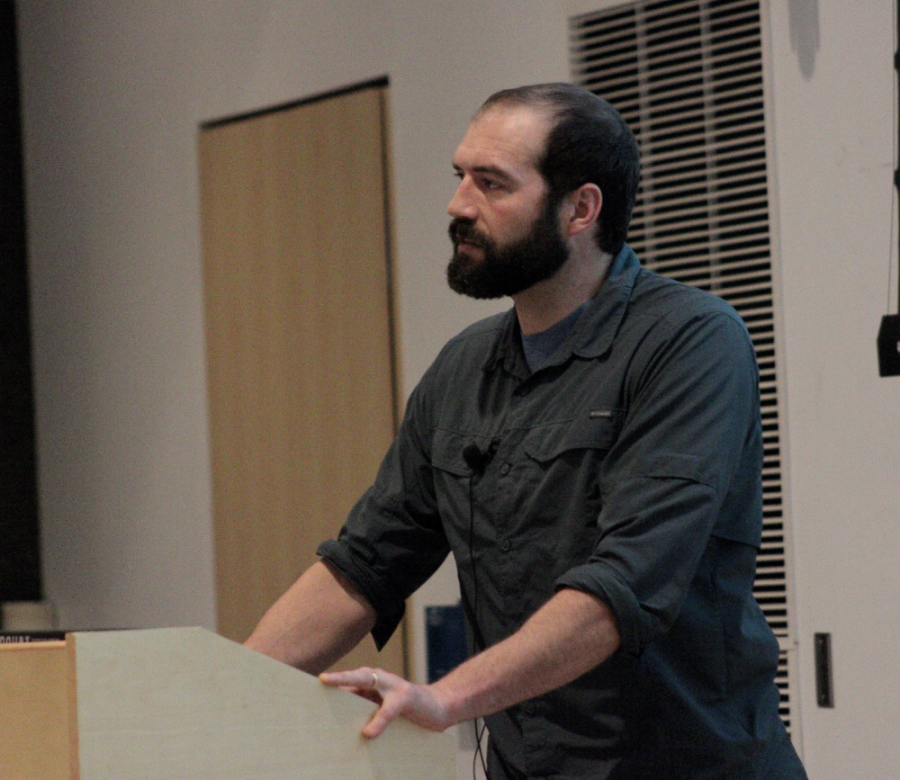Anthony W. Fontes, a human geographer, ethnographer and assistant professor at the American University in Washington D.C., gave a talk in the Environment and Natural Resources 2 Building to share his research on gangs, or maras, in Central America on Friday, Feb. 15.
The talk was titled “Mortal Doubt: Transnational Gangs and Social Disorder,” after his recently written book.
“I am trying to get it into a much more public sphere,” Fontes said. “I have been doing some interviews and things. I’ve become an expert on these topics and issues. I’ve been talking about different parts of these issues for a time now.”
RELATED: South African motivational speaker urges community to “Keep Hope Alive”
The talk itself focused on Fontes’ research, specifically in Guatemala City, and how he saw the incredible violence that maras perpetrated, but also how he believed that maras were being used as hired guns and a cover for a bigger, structural, violent system.
Fontes explained that his goal with his research has not been to defend the maras’ actions but rather to show the deeper complexity of the issue in Central America.
“What my research does is it picks apart, it dismantles this idea that someone is either a victim or a perpetrator and brings together there are only such things as victim-perpetrators,” said Fontes. “There are people who have been victimized and from that victimization … they have become perpetrators of violence on the other side.”
According to Fontes, it is about challenging the idea that maras are the only ones to be blamed for the violence in Central America.
“What it shows is that it takes away the easy answer of blaming gangs for everything that is going wrong in Central America and potentially what could go wrong in the U.S.,” Fontes said. “You have to understand that while these people have done the most horrible things you can imagine … and understand how their actions are symptoms of these greater structural forces that we all have a part in one way or another.”
Fontes told the audience that he researched maras in Central America for seven years and lived in various countries in Central America on and off between 2011 and 2017.
According to Fontes, before he went to graduate school, he was an immigration asylum legal case worker in California. While he worked in California, the majority of his clients were migrants from Mexico and Central America. He learned the history of the U.S. involvement in the mara problem from stories from his clients.
It was then, after talking to his clients and understanding some of the background of why the maras were such an issue, that he wanted to know more of what would make someone flee their home country, which then led him to research maras in Central America.
Fontes explained that he believes the world is in a pivotal time politically, especially in the U.S., when dealing with immigrants.
“We are living in a time when … the rise of anti-immigrant politics has come to dominate the media cycle and U.S. politics in a way that hasn’t happened in probably an unprecedented way,” Fontes said. “My work exposes those histories of connection … that tie together the violence, suffering and poverty happening in Central America with the privilege we pretend to have in the U.S. showing that these things are absolutely connected to each other.”
RELATED: Eller alum discusses how student can build a “startup ecosystem”
Thomas Sullivan, a graduate student studying geography, came to the talk because he believed it would cover a variety of subjects.
“I think it was certainly an interesting exploration of the realities of this violence on the ground in Guatemala City, but also how the stories and images of this violence are circulated,” Sullivan said.
Follow Jake Toole on Twitter









